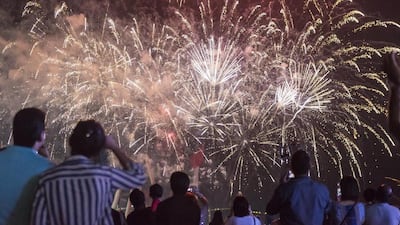SHARJAH // A crackdown on illegal fireworks being sold via social media is under way as people look to mark Eid Al Adha this weekend.
Police in Sharjah say electronic means is being used more often now to sell potentially dangerous fireworks that are delivered directly to the doors of customers. Officers arrest traders but police are also calling for the public to report suspicious online accounts.
Only licensed companies are legally allowed to use fireworks in the UAE.
Sharjah Police said that in June they arrested five Arab men who were using social media to sell fireworks.
Colonel Ibrahim Mussabah Al Ajel, the director of the Criminal Investigation Department, said that, after spotting the accounts belonging to the men online, officers went undercover to pose as a buyer.
“The men were arrested upon delivering the fireworks,” he said, adding that the fireworks were confiscated and the men referred to court.
Yousuf Al Bahar, of Al Bahar Advocates and Legal Consultants, said the punishment for selling fireworks illegally in the UAE could be jail time of six months or more and fines of Dh10,000.
“We are trying to promote awareness among community members about the dangers associated with fireworks, especially among children and teenagers who would get injured or burnt when playing with them,” Colonel Al Ajel said.
Fireworks are also sold on the street, he added, and they are sometimes even sold as a sideline for legitimate businesses such as grocery stores and hypermarkets.
“Parents have to also educate their children about fireworks’ dangers and prohibit them from firing them, especially inside the house,” he said.
In an incident in 2007 two workers were killed and two policemen injured when 300kg of fireworks exploded in the Al Jurf industrial area of Ajman.
Residents of Sharjah and Ajman said teenagers often set off fireworks after midnight, alarming people in their neighbourhoods.
“It would be about 1am when we start hearing the explosions. My two children often wake up terrorised and crying due to the loud noise. It takes me a while to calm them down, mainly the younger one, who is only 2,” said Saeedah Mahmoud, 36, from Al Rawda, Ajman.
In Al Muwaihat, Ajman, where a lack of street lighting offers good hiding spots for teenagers to play with fireworks, Nora Abdul Hameed, 40, said it is a constant problem.
“It happens quite often and becomes more often around occasions like Eid. I called police and reported the issue several times but the problem remains,” she said.
Ms Hameed said her 4-year-old daughter, Sarah, would wake up terrified whenever she heard the loud bangs of fireworks. “I don’t know what can be done to end this madness,” she added.
Essam Al Rifaa, 45, who lives in Al Taawon in Sharjah, said that fireworks during holiday weekends continue through the night until dawn. “Now as Eid Al Adha is here, we will have to live with the noise, which almost always prevents us from sleep,” he said.
Since 2014 Dubai Police has seized more than 50 tonnes of illegal fireworks and launched numerous campaigns, distributing pamphlets in Arabic and English, to raise awareness about the dangers.
Last year, the force launched “Make celebrations playful, not painful” to educate parents about their duty towards their children and society, and advising them to ensure their children know not to use fireworks.
As part of its campaign, police posted short films on Twitter, Facebook and YouTube, depicting the consequences of using fireworks, such as burns to the eyes and face.
The campaign followed an incident involving a six-year-old Pakistani girl who suffered severe burns in various parts of her body while playing with fireworks and matches last year. She had to undergo 16 reconstructive operations at Latifa Hospital.
A booklet distributed by Dubai Police at the launch of “Stop! Stay Safe” fireworks safety campaign in May last year stated that about 30,000 people around the world suffer eye injuries each year because of fireworks, with a quarter of them suffering permanent loss of vision.
salamir@thenational.ae


